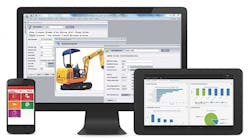Mobility, Mobility, Mobility is the Name of the Software Game
I’m sure everybody knows the old “location, location, location” slogan from real estate, often used in rental as well when thinking of where you want to put a rental branch. While compiling this month’s cover story on latest developments in rental-related software, it seems the current mantra should be “mobility, mobility, mobility.”
It seems like a lifetime ago when I acquired my first personal computer. I owned a small compact car at the time and, if I remember right, I had to borrow a friend’s car to carry home those three crate-like boxes. I didn’t have enough room for the computer, monitor and printer in my small apartment, so I converted my dining room table into an office so I could have the printer, computer and other desk supplies all in the same space.
So not only are computers themselves more compact, for the most part our mobile devices can accomplish most of the same functions as a laptop and even desktop computers. It’s definitely a different world.
I was thinking about how the whole car rental process has changed as I rushed to the airport on the way home from a recent trip. When I returned the rental car of course the car rental employee just scanned the car and printed out my receipt without me having to be handed a piece of paper and then go to the rental counter and stand in line. Those days are over. Now the car rental process is far more streamlined, making life much easier for the traveler hurrying to make a plane. And of course the receipt is probably e-mailed to the customer anyway.
The latest equipment rental software programs are making similar changes. At some rental centers they are just scanning an RFID code when a piece of equipment is returned. It’s not this streamlined at all rental centers yet, but the industry is headed in that direction.
As I said, mobility is definitely what rental software developers are aiming for – to provide access to the same information on one’s mobile phone or tablet as one finds on one’s laptop or desktop computer. This is true not only in the rental industry but in all fields. Just as I remember my first personal computer, I also remember years ago when I was learning about the rental industry and visiting jobsites with outside salesmen. I was impressed that they could call back to the rental center on their early-model mobile phones and find out from the counter staff if a certain piece of inventory was available. Sometimes, of course, it’s still done that way, and there’s nothing wrong with that. Sometimes a phone call is still the best and most reliable way to find out if a certain piece of equipment currently under repair is going to be ready tomorrow. But the ability to, on a regular basis, look at one’s mobile device to see what inventory is available, is an amazingly efficient way to do business quickly and process information.
From what I hear from the software industry, we’re really just scratching the surface of this type of capability.
Mechanics can use their mobile devices to order parts with a couple of keystrokes. Dispatching equipment, reviewing orders, viewing repair status, checking out customer invoices, verifying status of deliveries, getting an electronic signature, mapping routes, checking out a customer’s credit standing – increasingly almost any functionality that can be achieved at the rental center can be accomplished out in the field.
It’s all becoming quicker and more efficient for the customer and for the administration of the business as well. The rate of change and development is accelerating. And software companies no longer require major releases to add functionalities. That’s changing and accelerating too.
But has all of this technology made the quality of our lives better? I think a lot of us are still wrestling with that one. Somehow we all thought computerization and automation was going to make our lives more relaxed and give us a lot more leisure time. Perhaps it will someday. But that’s another topic!
I hope you enjoy this issue and think about the kinds of software programs you need and would like to develop in the future. Because chances are if you can imagine it, it will happen sooner than you think.







